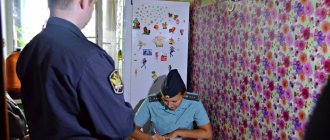Criminal Code of the Russian Federation in the latest edition:
Article 90 of the Criminal Code of the Russian Federation. Application of compulsory educational measures
1. A minor who has committed a crime of minor or moderate gravity may be released from criminal liability if it is recognized that his correction can be achieved through the use of compulsory educational measures.
2. The following compulsory educational measures may be assigned to a minor:
a) warning;
b) transfer to the supervision of parents or persons replacing them, or a specialized government body;
c) imposition of an obligation to make amends for the harm caused;
d) restricting leisure time and establishing special requirements for the behavior of a minor.
3. A minor may be simultaneously assigned several compulsory educational measures. The period for applying compulsory educational measures provided for in paragraphs “b” and “d” of part two of this article is set at a duration of from one month to two years when committing a crime of minor gravity and from six months to three years when committing a crime of medium gravity.
4. In the event of a systematic failure by a minor to comply with a compulsory educational measure, this measure, upon the proposal of a specialized state body, is canceled and the materials are sent to bring the minor to criminal responsibility.
Return to the table of contents of the document: Criminal Code of the Russian Federation in the latest edition
Comments on Article 90 of the Criminal Code of the Russian Federation
Article 90 of the Criminal Code of the Russian Federation provides for a special type of exemption from criminal liability, which is applied to minors, and in exceptional cases to persons who committed crimes between the ages of 18 and 20 (Article 96 of the Criminal Code of the Russian Federation).
The court has the right to assign a punishment to a minor in the form of imprisonment only if it is recognized that it is impossible for him to be corrected without isolation from society, with the reasons for the decision made (clause 17 of the Resolution of the Plenum of the Supreme Court of the Russian Federation dated 01.02.2011 N 1 “On the judicial practice of applying legislation regulating the peculiarities of criminal liability and punishment of minors").
Grounds and conditions for applying educational measures
The basis for exemption from criminal liability in connection with the use of compulsory educational measures is the commission of a crime of minor or moderate gravity by a minor (regardless of whether the crime was committed for the first time or not).
The condition for exemption from criminal liability is the court’s conclusion that it is possible to correct a minor without bringing him to criminal liability through the use of compulsory educational measures (without applying criminal punishment).
Types and characteristics of educational measures
The exact measures that can be prescribed in relation to a particular minor are decided solely by the court. The court takes into account the characteristics of the committed act, the teenager’s motives, aggravating and mitigating circumstances.
Several measures of coercive educational influence can be applied simultaneously.
If a teenager does not comply with educational instructions and systematically violates the procedure for his correction, compulsory measures against him will be cancelled. After this, the materials of his case will again go to court to bring him to criminal responsibility.
So, Art. 90 of the Criminal Code of the Russian Federation provides for four options for educational measures:
- Warning;
- Transfer to supervision;
- The obligation to make amends for the harm caused by the crime;
- Limitation of leisure and behavior.
Exemption from punishment for a teenager may involve any set of educational measures: from one to four together. Their decoding is presented in Art. 91 of the Criminal Code of the Russian Federation.
Warning
Prevention involves explaining to the teenager the harm caused by the crime and the possible consequences of relapse.
The issuance of a warning is formalized by a court order, which must contain the following information:
- About the committed act;
- About the teenager being held accountable;
- Negative moral and legal characteristics of a criminal act;
- A warning about the inadmissibility of committing a crime again;
- Explaining the consequences of relapse.
A copy of the decision to issue a warning is given to the minor and his legal representatives.
Transfer to supervision
The minor is placed under the supervision of the following persons:
- Parents;
- Guardians or adoptive parents;
- Specialized government bodies.
Transfer under supervision is urgent. As part of this criminal law measure, regular educational influence on the minor occurs.
Before placing a juvenile offender under the supervision of specific persons, the court must be convinced of their integrity.
If parents or guardians lead an antisocial lifestyle and cannot properly raise a teenager, they cannot be held responsible for his re-education.
The responsibilities of parents or guardians must be clearly explained to them and spelled out in the resolution.
A teenager is placed under supervision for crimes of minor gravity for a period of one month to 2 years, for a crime of moderate gravity - from 6 months to 3 years.
Obligation to make amends for harm caused
This type of educational measure is applied only taking into account two factors:
- The property or financial status of the minor;
- The work skills he has.
The obligation to make amends for the damage caused should involve either payment of monetary compensation for damaged property, or transfer of the damaged property of another, or restoration of property using one’s own labor skills.
Labor or financial obligations should not be an unbearable burden for a minor.
If the teenager works and receives monetary compensation, most likely, compensation for damages will be in monetary terms.
This is due to the fact that the teenager simply does not have time to restore the damaged property himself due to other employment.
Limitation of leisure and behavior
Most often, this educational measure is used in conjunction with others. It involves monitoring the behavior of a minor, which must be impeccable.
Behavioral and leisure restrictions can be implemented in the form of the following measures:
- Prohibition on the use of certain forms of leisure;
- Prohibition on driving motor vehicles;
- Curfew;
- Restrictions on a minor's stay outside the home;
- Restrictions on travel outside the locality, etc.
This list of restrictions is not exhaustive. The court, at its discretion, may order various types of restrictions.
The court may also impose requirements on the minor to find employment or reinstatement in an educational institution.
List of educational measures
Compulsory educational measures are measures of state coercion that are not punishment and are applied to minors who have committed a crime in order to correct them.
Part 2 of Article 90 of the Criminal Code of the Russian Federation provides for the possibility of assigning four types of compulsory educational measures, these include:
- warning;
- transfer under the supervision of parents or persons replacing them, or a specialized government body;
- imposing an obligation to make amends for the harm caused;
- restricting leisure time and establishing special requirements for the behavior of a minor.
The list of compulsory educational measures is exhaustive. The issue of applying educational measures to a minor is decided only by the court.
In accordance with Art. 90 of the Criminal Code of the Russian Federation, a minor may simultaneously be assigned several compulsory measures of educational influence, for example, warning and transfer to the supervision of parents, the imposition of an obligation to make amends for the harm caused and restriction of leisure. These measures are not divided into basic and additional and can be prescribed in any combination.
When transferring a minor to the supervision of parents or persons replacing them, the court must make sure that these persons have a positive influence on the teenager, correctly assess what he has done, and can ensure appropriate behavior and daily control of the minor. To do this, it is necessary to request characterizing material, check the living conditions of the parents or persons replacing them, the possibility of financial support for the teenager, etc. Despite the fact that the law does not require the consent of parents or persons replacing them to transfer a minor to their supervision, such consent must be obtained by the court.
If the court makes a decision to terminate a criminal case and apply to a minor, as a compulsory educational measure, transfer to the supervision of parents or persons replacing them (relatives, guardians), or a specialized government body, or restriction of leisure and establishment of special requirements for behavior, the resolution must the period during which the chosen measure is applied must be indicated
The period for applying compulsory measures of educational influence, provided for in clauses “b” and “d”, part 2 of Article 90 of the Criminal Code of the Russian Federation, is established to last from one month to two years when committing a crime of minor gravity and from six months to three years - when committing crimes of medium gravity.
Commentary on Article 90
1. The use of compulsory educational measures against a minor was also known to the Criminal Code of the RSFSR. However, the new Criminal Code, in addition to some terminological differences in the names of these measures, also contains more significant differences. First of all, compulsory educational measures can now be used not only when committing crimes of minor gravity (previously - crimes that did not pose a great public danger), but also crimes of moderate gravity. In addition, the new Criminal Code does not indicate by whom (which body) a minor can be released from criminal liability in connection with the use of compulsory educational measures and by whom (which body) these measures can be prescribed. In our opinion, exemption from criminal liability by the body of inquiry, investigator or prosecutor, as well as by the court is not excluded, but the appointment of these measures, taking into account their compulsory nature, is possible only by the court.
2. The use of coercive measures against a minor is an alternative to criminal liability that excludes the application of punishment to him.
3. The use of compulsory educational measures is possible if a number of conditions are met: 1) the crime must be committed for the first time; 2) the crime must not be more serious than a crime of average gravity; 3) the court must recognize the possibility of correcting the minor through educational measures. Only the presence of each of these conditions individually and in aggregate gives the court legal grounds for applying compulsory educational measures to a minor and releasing him from criminal liability.
4. Comparison of Art. 90 and 91 of the Criminal Code allows us to draw conclusions about the types of compulsory educational measures and their content. The list of types of coercive measures, as follows from Art. 90 of the Criminal Code is exhaustive, i.e. the court does not have the right, at its discretion, to assign any other type of compulsory educational measures other than those specified in the law. But the court retains the right to determine the content of these measures (see commentary to Article 91 of the Criminal Code).
5. The court may simultaneously impose several types of compulsory measures. This is quite justified, since they are different in nature and direction of influence and in reality can be combined. So, for example, a warning and transfer to parental supervision, the imposition of an obligation to make amends for the harm caused, and restriction of leisure time may be simultaneously prescribed.
6. In the event of a systematic failure by a minor released from criminal liability to comply with the compulsory educational measure assigned to him, Part 4 of Art. 90 of the Criminal Code allows for the possibility of canceling this measure and bringing the person to criminal liability. This emphasizes the virtually conditional nature of the use of compulsory measures of educational influence in relation to minors.
7. In our opinion, systematic failure by a minor to comply with a compulsory measure of educational influence must be understood as a violation (failure to fulfill) the duties assigned to him more than twice. It seems that only such violations that are recorded by a specialized government body entrusted with the implementation of compulsory educational measures should be taken into account.
8. The specialized state body entrusted with the implementation of compulsory educational measures is currently the commission for minors under the administration of the relevant local government body.
Scientific and practical commentary:
1. A minor may be released from criminal liability both on general grounds and on special grounds.
It must be borne in mind that when applying general types of release, the specifics of bringing to criminal responsibility persons under 18 years of age are taken into account. A minor may be released from criminal liability in connection with active repentance (Article 75 of the Criminal Code), in connection with reconciliation with the victim (Article 76 of the Criminal Code). These grounds do not provide for any exceptions from the general rules. When releasing a person under 18 years of age from criminal liability due to the expiration of the statute of limitations (Article 78 of the Criminal Code), it is necessary to take into account the specifics of the statute of limitations in relation to minors (see commentary to Article 94). Amnesty and pardon may be applied to persons under 18 years of age, as well as to adult criminals. 2. Along with general types of exemption from criminal liability and punishment, the legislation also contains special types that apply only to persons under 18 years of age. According to Part 1 of the commented article, the release of a teenager from criminal liability is possible in the presence of two circumstances: 1) the act must relate to crimes of minor or moderate gravity; 2) correction of a minor is possible through educational measures. 3. Exemption from criminal liability is possible at any stage of legal proceedings. According to Art. 427 of the Code of Criminal Procedure of the Russian Federation, if during the preliminary investigation of a criminal case of minor or moderate gravity it is established that the correction of a minor can be achieved without the use of punishment, then the investigator, with the consent of the head of the investigative body, as well as the investigator with the consent of the prosecutor, have the right to terminate the criminal prosecution and file a petition before the court on the application of compulsory educational measures to a minor accused. The head of the investigative body or the prosecutor sends the corresponding resolution, together with the criminal case, to the court. Termination of criminal prosecution is not allowed if the minor suspect, accused or his legal representative objects to this. 4. All special types of release of persons under 18 years of age from criminal liability are associated with the use of compulsory educational measures. They should be understood as measures of state coercion established by law against persons who have committed crimes of minor or moderate gravity, in order to correct them by pedagogical means without bringing them to criminal liability. They are compulsory because they are appointed and carried out regardless of the will of the perpetrator or his legal representative, and are binding both for the persons who committed the crime and for other persons. Their implementation is ensured by the power of state power. In terms of their content, the measures provided for in Part 2 of Art. 90 of the Criminal Code are of an educational nature. When they are used, the influence on a minor is primarily through persuasion, bringing to consciousness a negative assessment of his action, and the inadmissibility of socially dangerous behavior. The goal of correction is achieved without bringing the teenager to criminal liability. Thus, these measures are educational in their content, and compulsory in the nature of their execution. They have only superficial similarities with criminal punishment. There are qualitative differences between them. There are no elements of punishment in coercive measures. They do not entail a criminal record and are not divided into main and additional types. Compulsory educational measures are applied to persons under 18 years of age at the time of their appointment. A person reaching the age of majority precludes their use. 5. The article under comment provides for the following compulsory educational measures: a) warning; b) transfer to the supervision of parents or persons replacing them, or a specialized government body; c) imposition of an obligation to make amends for the harm caused; d) restricting leisure time and establishing special requirements for the behavior of a minor. 6. A minor may be simultaneously assigned several types of measures from those specified in the commented article. 7. The period for applying compulsory measures of educational influence in the form of transfer under the supervision of parents or persons replacing them, or a specialized government body and restrictions on leisure and the establishment of special requirements for the behavior of minors (clauses “b” and “d”, part 2 of Art. 90) is provided for a duration of from 1 month to 2 years - when committing a crime of minor gravity and from 6 months to 3 years - when committing a crime of medium gravity (Part 3 of Article 90). 8. In the event of a systematic failure by a person under 18 years of age to comply with a compulsory educational measure, this measure, upon the proposal of a specialized government body, is canceled and the materials are sent to bring the minor to criminal responsibility (Part 4 of Article 90). Thus, release from criminal liability with the use of educational measures is a conditional measure. 9. Federal Law of May 21, 1999 N 120-FZ “On the fundamentals of the system for the prevention of neglect and juvenile delinquency” <1> obliges bodies and institutions of the system for the prevention of neglect and juvenile delinquency to carry out individual preventive work with minors convicted of committing crimes of minor or moderate gravity and those released by the court from punishment using compulsory educational measures (clause 13, part 1, article 5). This system includes: commissions for the affairs of minors and the protection of their rights, formed in the manner established by the legislation of the Russian Federation and its constituent entities; social protection authorities; education authorities; guardianship and trusteeship authorities, youth affairs authorities; health authorities; employment service bodies, internal affairs bodies. ——————————— <1> NW RF. 1999. N 26. Art. 3177.
Grounds for canceling educational measures
The basis for canceling a measure of educational influence, in accordance with Part 4 of Article 90 of the Criminal Code of the Russian Federation, is the systematic failure of a minor to comply with the measure of influence assigned to him, with the exception of a warning.
Systematic failure by a minor to comply with a compulsory measure of educational influence should be understood as repeated (more than two times) violations during the period of application of a compulsory measure of educational influence appointed by the court (for example, restricting leisure time, establishing special requirements for his behavior), which were registered in the prescribed manner by a specialized body, exercising control over the behavior of a teenager (clause 32 of the Resolution of the Plenum of the Supreme Court of the Russian Federation dated 01.02.2011 N 1).
If a minor is simultaneously assigned several compulsory measures of educational influence, and within a certain period he has committed single violations (no more than two times for each of them), such violations cannot be recognized as systematic, giving grounds for the court to apply the provisions of Part 4 of Article 90 of the Criminal Code of the Russian Federation on the cancellation of the compulsory measure.
Cancellation of a compulsory educational measure and the resumption of proceedings in the case are permissible if the statute of limitations for bringing a minor to criminal responsibility has not expired (Article 94 of the Criminal Code of the Russian Federation).
A specialized government body, which, in accordance with Art. 90 of the Criminal Code of the Russian Federation, a minor can be placed under supervision, and the body that has the right to apply to the court with a proposal to cancel a compulsory educational measure in cases of systematic non-compliance by a minor is the commission on affairs of minors and the protection of their rights.
Another comment on Art. 90 of the Criminal Code of the Russian Federation
1. For persons under eighteen years of age, in addition to the general types of exemption from criminal liability (Articles 75 - 78 of the Criminal Code of the Russian Federation), such a special type as exemption from criminal liability in connection with the use of compulsory measures of educational influence may be applied, subject to certain conditions: a) the crime must be classified as minor or moderate; b) establishing the possibility of correction through the use of compulsory educational measures.
2. In part 2 of Art. 90 of the Criminal Code of the Russian Federation provides an exhaustive list of compulsory educational measures. A minor may be simultaneously assigned several compulsory educational measures.
3. The duration of application of such compulsory measures of educational influence, such as transfer to the supervision of parents or persons replacing them, or a specialized government body and restriction of leisure or the establishment of special requirements for the behavior of a minor, is established depending on the category of crimes.
4. In the event of a systematic (at least three times) failure of a minor to comply with a compulsory educational measure, this measure, upon the proposal of a specialized government body, is canceled and the materials are sent to bring the minor to criminal responsibility. If a minor has been assigned several educational measures, then their cancellation is possible even if he does not comply with at least one of them.




